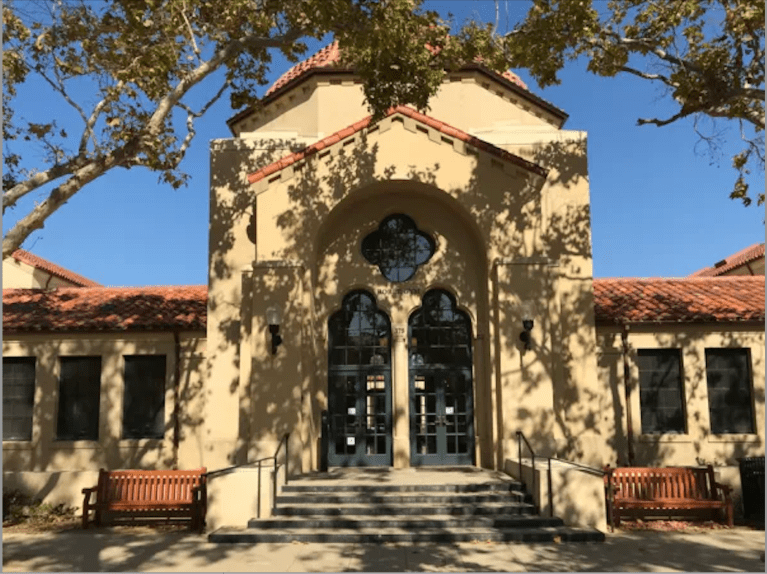The TAPS Main Stage production of “The Wolves,” directed by Ph.D. candidate Marina Johnson, “kicked” around nuanced themes of identity, vulnerability and adolescent aspirations and showcased the concept that every player has their own unique shot in the game of life.
“The Wolves” is a dynamic play that captures the lives of a high school girls’ soccer team (known as The Wolves) as they navigate the complexities of teamwork and the challenges of growing up. I attended the second of three performances on March 8 at the Harry J. Elam, Jr. Theater, and was astounded by the stunning set, dramatic lighting and intricate character work presented by each actor.
Upon entering the theater, the audience was met with an undeniably “real” feeling set — a stage designed as a grassy field adorned with sneakers, backpacks, benches and water bottles. The performance began in medias res, with the actors enthusiastically running onto the stage in overlapping high energy conversations. The topical lighthearted banter was highly comedic and landed well among audience members.
I was impressed by the immersive atmosphere created by the actors, who performed exercises like crunches, jumping jacks and stretches in synchrony while conversing onstage. The energetic choreography of soccer drills created a palpable sense of camaraderie among the teammates, drawing the audience into the world of the play with captivating intensity.
What struck me most about this play was its raw authenticity and the depth of its characters. A unique aspect of this performance was that there were no principal or leading actors; every character in the ensemble had their own individual bits and storylines that intertwined seamlessly, with no one character particularly outshining the other. Each member of the team is distinct, with their own struggles, dreams and insecurities, yet united by their shared passion for the sport of soccer.
#46, played by Deniz Yagmur Urey ‘24, provided a standout performance as a homeschooled misfit, viewed as an outsider by the team for her uncommon life practices. Her subtle yet charismatic line delivery was hilarious (notably, her response to the team mistakenly referring to the style of her home, a yurt, as a “yogurt”), and watching her find her place within the social hierarchy of the team over the course of the production was gratifying.
One of the play’s greatest strengths lies in its ability to tackle complex themes with sensitivity and tasteful coverage. The play ingeniously addresses a range of social fault lines, such as teenage “cliques,” gossiping and young death. From concerns with body image and identity to love and loss, “The Wolves” fearlessly confronts the realities that shape the lives of young women today in an immensely resonant and thought-provoking manner.
As the play develops, for instance, an overall diminishment in the team’s health and morale is evident. A girl who had been struggling with an eating disorder, #2 (Sophia Wang ‘26) has a nosebleed onstage and #7 (Eryn Perkins ‘25) gets injured and is forced to use crutches for the remainder of the play.
The declining physical health of the team parallels a decline in their social health, as the girls begin to have serious disagreements involving their personal lives, drama over #7’s boyfriend, and the girls’ opinions about one another. The fracturing of the team was portrayed with immense rawness and realism, and was mirrored in the play’s set design itself.
In a particularly climatic scene, the back wall of the stage separates into two halves, seamlessly opening toward opposite ends of the room filled with beaming lights and intense fog. This jaw-dropping moment of suspense ended with a member of the team walking into the abyss of light, demanding the attention of everyone in the audience. This moment, as we come to learn, signifies the accidental death of one of the girls, and introduces sharp developments of grief among the teammates.
The ensembled cast delivered a stellar performance, bringing to life the multifaceted dynamics of teenagehood with remarkable nuance and sincerity. This production demanded and demonstrated a strong command of physicality, displayed in intense scenes of kicking soccer balls and running while simultaneously spewing quick witted banter with not a single actor missing cues, fumbling lines or sacrificing emotional connection at the sake of keeping up athletically.
For many plays that are dense in textual dialogue, it can often be difficult for audiences to entirely follow specificity in discourse. Though “The Wolves” piece was chock-full of quick banter and intricate conversation, the commitment to storytelling and emotional clarity made this piece a joy to follow throughout its 90-minute runtime.
Highly energetic music, stunning visuals and intense exercises in between scene changes provided great intricacy. Although the scenes individually were relatively long, they never dwelled on a singular topic, avoiding staleness and allowing the beats of the scene to flow seamlessly.
From the spirited banter during warm-ups to the poignant moments of vulnerability, the actors captured the essence of adolescence, eliciting laughter, empathy and introspection from the audience. Each actor fully and authentically embodied their characters in dynamic ways, and there wasn’t a dull moment in this performance. The immense hard work and dedication of everyone involved in “The Wolves” was certainly evident, and made for a thoroughly compelling piece.
